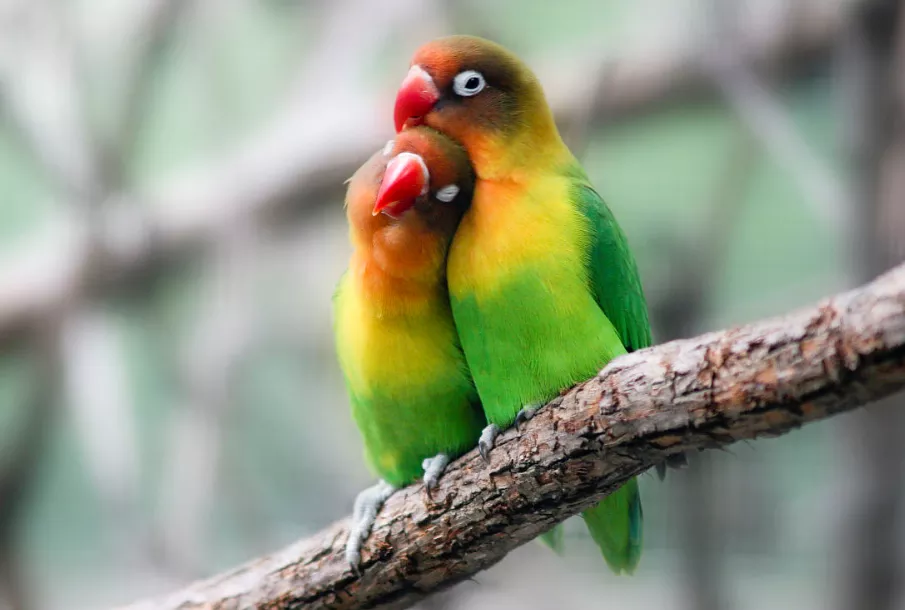Lovebirds are small, brightly-colored parrots that have become increasingly popular as pets in recent years. Their charming personalities and striking beauty make them a favorite among bird lovers. However, before deciding to bring one of these feathered friends into your home, it is important to consider whether lovebirds make good pets and what kind of care they require.
In this article, we will explore the characteristics of lovebirds, their suitability as pets, and the essential aspects of caring for these birds, including their diet, housing, health, and behavior.
Characteristics of Lovebirds
Lovebirds are social creatures that thrive on interaction with their owners and other birds. They are known for their affectionate nature and will often bond closely with their human companions. Lovebirds can live up to 15 years in captivity, making them a long-term commitment for prospective pet owners.
There are nine species of lovebirds, all of which are native to Africa. The most commonly kept species as a pet is the Peach-faced Lovebird (Agapornis roseicollis), which has a green body and a bright red face. Other popular species include the Fischer’s Lovebird (Agapornis fischeri) and the Masked Lovebird (Agapornis personata).
Suitability as Pets
Lovebirds can be great pets for those who are willing to put in the time and effort required to care for them properly. However, they may not be suitable for everyone.
Firstly, lovebirds require a lot of attention and socialization to stay happy and healthy. They need daily interaction with their owners, as well as regular opportunities to fly and explore outside of their cage. Therefore, if you cannot commit to spending several hours a day interacting with your bird, then a lovebird may not be the best choice for you.
Secondly, lovebirds can be noisy. They are vocal birds and will often chirp and squawk throughout the day. This may not be an issue for some owners, but it could be a problem if you live in an apartment or have close neighbors.
Finally, lovebirds require a specific diet and environment to thrive. We will cover these topics in more detail below.
Diet
A healthy diet is essential for the well-being of lovebirds. In the wild, they primarily feed on seeds, fruits, and insects. In captivity, their diet should consist of a high-quality pellet mix supplemented with fresh fruits and vegetables.
It is important to avoid giving lovebirds foods that are high in fat, salt, sugar, or caffeine, as these can be harmful to their health. Additionally, avocado should be avoided, as it contains a toxin that can be fatal to birds.
Fresh water should always be available to your lovebird and should be changed daily.
Housing
Lovebirds require a spacious cage that allows them room to fly and move around comfortably. The minimum recommended size for one pair of lovebirds is 18 x 18 x 24 inches. However, bigger is always better when it comes to bird cages, so consider getting the largest cage you can afford.
The cage should be placed in a quiet area of your home away from drafts, direct sunlight, and extreme temperatures. Lovebirds are sensitive to temperature changes and should be kept in a room that stays between 65 and 80 degrees Fahrenheit.
The cage should also be equipped with perches, toys, and plenty of clean bedding material for your bird to snuggle into.
Health
As with any pet, it is important to regularly monitor your lovebird’s health and seek veterinary care if necessary. Signs of illness in lovebirds include lethargy, loss of appetite, discolored droppings, difficulty breathing, and changes in behavior.
Lovebirds are prone to certain health issues, including respiratory infections, feather plucking, and beak and nail overgrowth. To prevent these problems, your lovebird should receive regular check-ups from a qualified avian veterinarian.
Behavior
Lovebirds are intelligent and curious birds that require mental stimulation to stay happy and healthy. They enjoy playing with toys and interacting with their owners. However, they can become territorial and aggressive if not socialized properly. It is important to handle and interact with your lovebird frequently to prevent these issues.
Conclusion
In conclusion, lovebirds can make great pets for those who are willing to provide them with the care, attention, and environment they need to thrive. They are affectionate, social birds that form strong bonds with their owners and other birds. However, they require a specific diet, housing, and environment to stay healthy and happy, as well as regular veterinary care.
If you are considering getting a lovebird as a pet, make sure you have the time, energy, and resources required to give them the care they need. With proper care, lovebirds can bring joy, companionship, and beauty into your home.


 Facebook
Facebook  Instagram
Instagram  Youtube
Youtube 